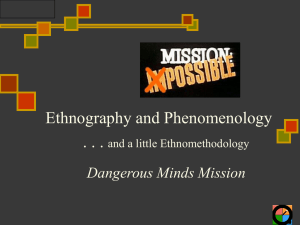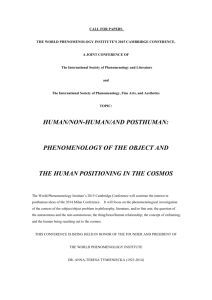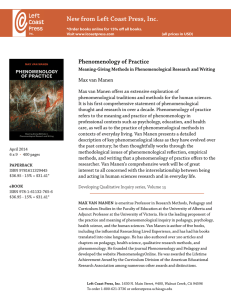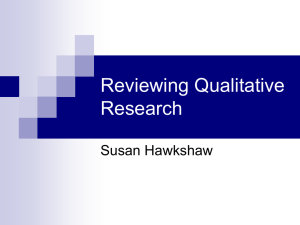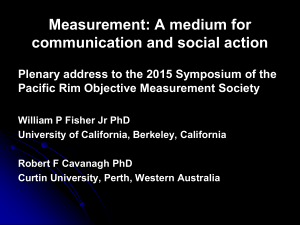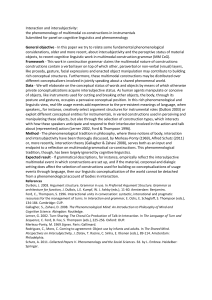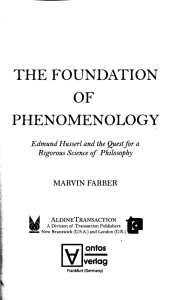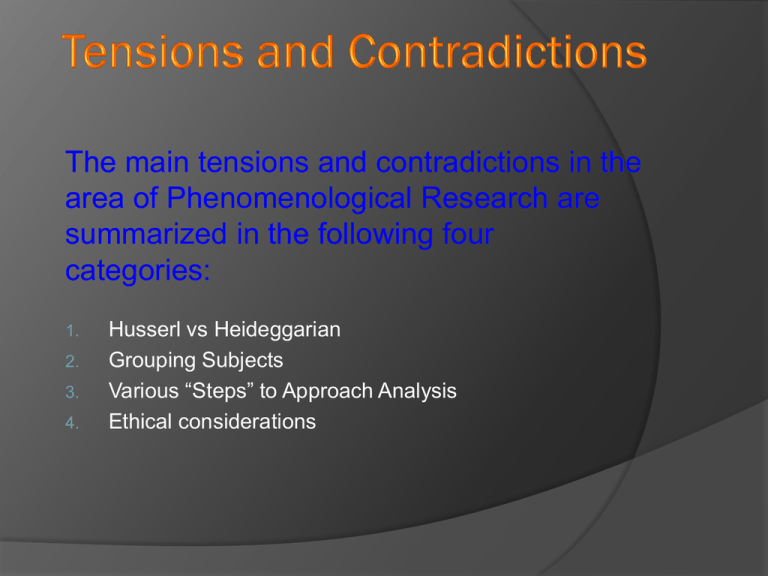
The main tensions and contradictions in the
area of Phenomenological Research are
summarized in the following four
categories:
1.
2.
3.
4.
Husserl vs Heideggarian
Grouping Subjects
Various “Steps” to Approach Analysis
Ethical considerations
Transcendental
Approach
Direct Approach
Detached Observer
Observes in at attempt
to get inside subjects
head
Focus on encouraging
subjects to reflect
Purpose is to reflect
participant’s
understandings
Subjective and objective
Rational Thinking
Hermeneutic Approach
Indirect Approach
Connected and Involved
Observer
Focus on Shared
Experiences
Field notes capture
unreflective activity
Uses everyday
Language
Abandoned subjectivity
and objectivity
Intuitive Thinking
The grouping of subjects is
controversial.
Husserl believed it was not possible to group
individual experiences together as each was
unique.
Many others group subjects to make
conclusions on a group of subjects involved
in the research with an attempt to categorize
subjects into different “boxes”.
Various researchers approach phenomenology with
different steps towards their research.
A Phenomenological Case Study of A Principal
Leadership
Step 1- Includes stating the problem or purpose of the
study while expressing limitations of the study.
Step 2- Review the literature in relation to the research
that you will explore.
Step 3- Design your research including data collection
methods, data management, and summarizing data.
Step 4- State purpose of research and express
demographics involved in the research.
Step 5- Discuss conclusions and recommendations for
further study.
A Phenomenology of Teaching With Laptop
Computers
Step 1- Introduce the background information
including stating the problem, describing the
purpose and significance of the study.
Step 2- Review the Literature including and use
it to choose a desired methodology.
Step 3- Investigate the phenomenon by
observing and exploring.
Step 4- Make conclusions and
recommendations for further research.
Its difficult to be free from your own personal bias.
Inconsistencies exist, not all approaches follow the
proven theories. Often the listed theory approach is
not actualized.
It’s a method of description only, does not always
explain or analyze results.
The relationship of objective and subjectivity.
The resemblance between particular objects is
dishonest because its tough to make conclusion from
subjects of different class
“All that is general, learned, everything achieved by
culture is nothing but the detour we must take in order to
bring the immediate to focus.”-Ortega Gasset
Questions on whether we can truly
understand what another person is thinking
and feeling.
Difficulties relation to people of other sex,
culture, or class.
In education, many researchers avoid
phenomenology because of the amount of
time that it takes to complete research
properly (similar to the first case study)
Relies heavily on the use of language in
explanation (ie: “the girls cheeks were like
a rose”)
1. A nice overview of what phenomenology is (Flood plus Knack
article provide more complete basic overview):
- Flood, A. (2010). Understanding Phenomenology: Anne Flood looks at the
theory and methods involved in phenomenological research. 7(9), Nurse
Researcher
2. Another overview of phenomenological research (touches on things
the Flood article misses):
- Knaack, P. (1984). Phenomenological Research 6(107), Western Journal
of Nursing Research doi: 10.1177/019394598400600108
3. Reviews some of the ethical considerations involved in
phenomenology:
- Walker, W. (2007). Ethical Considerations in Phenomenological Research;
Wendy walker examines some important ethical issues that researcher
need to consider before and during phenomenological research. 36(10),
Nurse Research
4. The author was a professor of educational research and the founder of
several educational journals.
-Somekh, Bridget & Lewin Cathy. "Theory and Methods in Social Research"
(2011)Sage publications, Los Angeles. Text.
5. Discusses practical solutions in developing protocols for real life
research problems.
-O'Leary, Zina. "The Essential Guide to Doing Your Research Project."
(2010)Sage publications, Los Angeles. Text
6. The author focuses on the differences between Hermeneutic
Phenomenology and more traditional forms. The author works at the
University of Calgary.
-Laverty, Susann, M. "Hermeneutic Phenomenology and Phenomenology:
A Comparison of
Historical and Methodological Consideration," International Journal of
Qualitative Study, (2003). Retrieved on February 16, 2012.
http://www.ualberta.ca/~iiqm/backissues/2_3final/pdf/laverty.pdf
Case Studies:
7. A Phenomenology of Teaching with Laptop Computers: A Case Study
Though the Eyes of the Trainer. 1999,
http://pirate.shu.edu/~baoxuemi/bao9808.pdf
8. A Phenomenology Case Study of a Principal Leadership
(OUTSTANDING- Lean on Me)
http://digitalarchive.gsu.edu/cgi/viewcontent.cgi?article=1089&context=eps
_diss&seiredir=1&referer=http%3A%2F%2Fwww.google.ca%2Furl%3Fsa%3Dt%26rc
t%3Dj%26q%3Dcase%2B
study%2Bphenomenology%2Beducation%26source%3Dweb%26cd%3D14
%26ved%3D0CEYQFjADOAo%26url%3Dhttp%253A%252F%252Fdigitalar
chive.gsu.edu
%252Fcgi%252Fviewcontent.cgi%253Farticle%253D1089%2526context%
253Deps_
diss%26ei%3Djw0rT9D4Iun2sQLFbz8DQ%26usg%3DAFQjCNHbbAyy7Tsip7sYholxkeo_GRuAQ#search=%22case%20study%20phenomenology%20educ
ation%22
-General websites focused on a wide
variety of Phenomenology topics
9. www.phenomenologyonline.com
10. www.phenomenology.org
http://youtu.be/s1pj7QUVxhQ
-Hopefully your not the lady in this
video….hopefully you are not the other guy
either!

